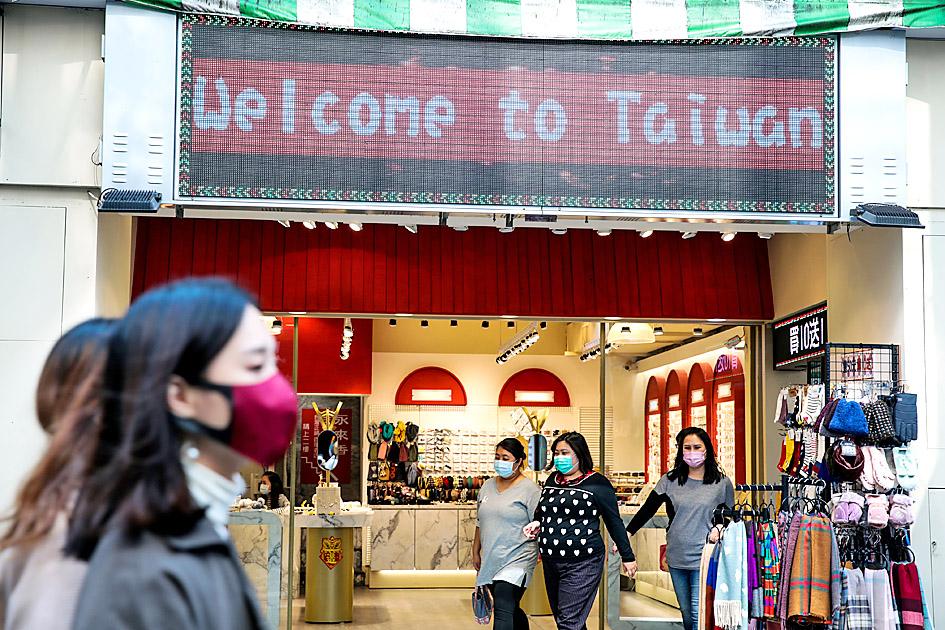More than 60 percent of local retail stores plan to expand their business scale this year as sales are likely to pick up further after a mild increase last year, despite the COVID-19 pandemic, CBRE Taiwan said in a report on Friday.
Sixty-three percent of retail stores expressed their intention to revive expansion plans that ran aground last year because of the COVID-19 outbreak and 44 percent plan to bolster sales over the Internet, it said.
Retail sales last year edged up 0.2 percent to NT$3.86 trillion (US$136.22 billion), as the nation’s effective control of the virus made a quick recovery possible in the second quarter, CBRE analyst Man Chan (陳頌民) said in the report.

Photo: Bloomberg
Based on the firm’s survey of retail investment in the Asia-Pacific region, Taiwan’s investment interest is much healthier than the regional average at 49 percent, the report showed.
Still, 30 percent of local stores said they would put off expansion plans — lower than 39 percent elsewhere — according to the survey, whose respondents include restaurants, supermarkets, entertainment facilities, as well as cosmetics and fashion stores.
More than 50 percent of retail stores abandoned expansion plans after seeing their revenue shrink by a double-digit percentage at the height of the pandemic in April last year, Chan said.
However, many have become active again in searching for expansion sites, encouraged by a correction in rental fees and the nation’s healthy economic outlook, he said.
The Directorate-General of Budget, Accounting and Statistics on Saturday raised the nation’s economic growth forecast to 4.64 percent for this year, a new high since 2014, and predicted that private consumption would increase 3.74 percent, reversing a 2.37 percent decline last year.
Retailers would also seek to tap into e-commerce, as online retail sales last year totaled NT$341.8 billion, surging 19 percent from a year earlier, backed by a low-contact economy, while 77 percent of local eateries plan to improve food delivery offers in light of surging credit-card spending for food delivery services, CBRE analyst Ping Lee (李嘉玶) said in the report.

On Tuesday, US President Donald Trump weighed in on a pressing national issue: The rebranding of a restaurant chain. Last week, Cracker Barrel, a Tennessee company whose nationwide locations lean heavily on a cozy, old-timey aesthetic — “rocking chairs on the porch, a warm fire in the hearth, peg games on the table” — announced it was updating its logo. Uncle Herschel, the man who once appeared next to the letters with a barrel, was gone. It sparked ire on the right, with Donald Trump Jr leading a charge against the rebranding: “WTF is wrong with Cracker Barrel?!” Later, Trump Sr weighed

SinoPac Financial Holdings Co (永豐金控) is weighing whether to add a life insurance business to its portfolio, but would tread cautiously after completing three acquisitions in quick succession, president Stanley Chu (朱士廷) said yesterday. “We are carefully considering whether life insurance should play a role in SinoPac’s business map,” Chu told reporters ahead of an earnings conference. “Our priority is to ensure the success of the deals we have already made, even though we are tracking some possible targets.” Local media have reported that Mercuries Life Insurance Co (三商美邦人壽), which is seeking buyers amid financial strains, has invited three financial

Artificial intelligence (AI) chip designer Cambricon Technologies Corp (寒武紀科技) plunged almost 9 percent after warning investors about a doubling in its share price over just a month, a record gain that helped fuel a US$1 trillion Chinese market rally. Cambricon triggered the selloff with a Thursday filing in which it dispelled talk about nonexistent products in the pipeline, reminded investors it labors under US sanctions, and stressed the difficulties of ascending the technology ladder. The Shanghai-listed company’s stock dived by the most since April in early yesterday trading, while the market stood largely unchanged. The litany of warnings underscores growing scrutiny of

OUTLOOK: Among the six sub-indices, only the stock market confidence sub-index rose due to strong equity performance and expectations of a US Federal Reserve rate cut Consumer confidence weakened further this month, sliding to its lowest level in two-and-a-half years as households grew increasingly uneasy about the economic outlook, job security and big-ticket spending, a survey by the National Central University showed yesterday. The consumer confidence index fell 1.07 points from last month to 63.31, the weakest number since May 2023, said the university’s Research Center for Taiwan Economic Development (RCTED), which conducts the monthly poll. “Although the Directorate-General of Budget, Accounting and Statistics recently increased Taiwan’s GDP growth forecast for this year to 4.45 percent, consumer sentiment tells a different story,” RCTED director Dachrahn Wu